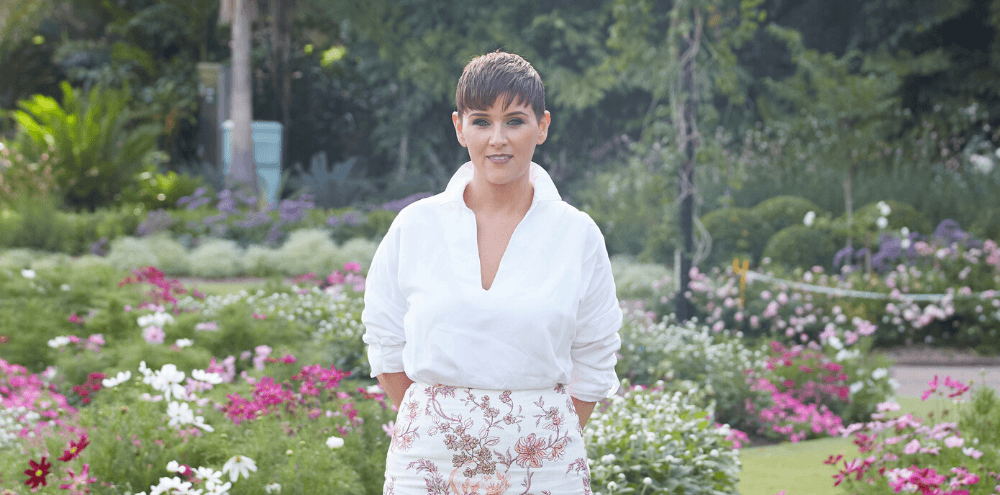Jane’s story

Jane Anderson was a happy, healthy 33-year-old mother of three children with a loving husband, great job and busy social life, until she found a lump on her breast while showering one day.
Jane was a low risk for a breast cancer diagnosis. Having delivered and breastfed three children, having no family history of breast cancer, and being considered otherwise as fit and healthy, the diagnosis came as a total surprise.
Within two weeks, Jane had received the results of her mammogram. Things were not looking good—Janes had been diagnosed with a triple negative breast cancer.
Mater Breast Care Nurse Jen Dalton explains that around 15 per cent of breast cancer diagnoses are triple negative.
“This is where oestrogen, progesterone and HER2 receptors are not found. They are generally responsive to chemotherapy; however, treatment usually involves surgery and radiotherapy as well. It’s a very intense experience for the patient,” she said.
“Jane underwent seven months of treatment at Mater under our care; it was an incredibly difficult time for her and her loved ones.”
Jane describes the experience of having chemotherapy as the hardest thing she has ever had to do.
“It was a really rough trot; the mental and physical exhaustion was often unbearable. I have three young children and there were often days where I was too physically exhausted to get out of bed,” she explains.
“As a mother, you are so used to putting yourself last, because that’s just what you do for your family. Through my illness, I was forced to take care of myself and that ultimately turned out to be the lesson I needed.”
On 26 April 2018, Jane was declared cancer free. She had overcome so much in such a short time, but she knew her journey was not over yet, and she found a new lease on life.
“I realised life was too short and I couldn’t keep going at the speed I had been. I learned to slow down and appreciate the little things. I also have a new level of self-confidence where I don’t second guess myself,” she said.
“I know it sounds a bit corny, but I would liken it to a ‘spiritual awakening’ for lack of a better phrase. I have tried to turn a negative into a positive, as I know it’s all about attitude and perspective.”
“I was very well looked after at Mater—the team were incredible and I am so grateful for everything they did for me; especially Jen and her team and my surgeon Dr Emma Clarkson. They were all amazing,” she said.
Today life is good for Jane; she is studying counselling, working as a make-up artist and so far has a clean bill of health.
“I am taking my recovery day by day. I have learnt to be kinder to myself, slow down and listen to my body. I make sure I take time out when I need to,” she said.
“To other women who may be going through this, I want them know that while it seems like it isn’t going to end and you forget what it’s like to not be sick, don’t lose hope and don’t be afraid to ask for help.
“Finally, to girls everywhere, no matter how young, no matter how fit, no matter how healthy… make sure you check your breasts and see your doctor if you find something.”
At Mater Research—Mater’s world-class research institute—researchers are continuing to uncover new ground in the best approaches to treat, and ultimately prevent, breast cancer.
Mater Researcher Dr Patricia Carreira is researching the progression and development of the disease. She’s exploring mobile DNA—‘jumping genes’—the ability of cancer genes to spread to new areas in the body.
Dr Carreira is investigating how ‘jumping genes’ affect cancer progression, and whether they can be used to identify which cancers are going to spread (metastasise). She is also examining whether it is possible to control the spread of cancer, by controlling the ‘jumping gene’ elements within the cancer.
While there is still a long way to go, this research could give doctors a better understanding of what makes a cancer spread, and which cancers are likely to metastasise. Knowledge of a patient’s specific cancer risk means that medical teams can personalise treatment to suit a woman’s individual circumstances and improve her quality of life.
As a result, the survival rates of women diagnosed with breast cancer could improve.
Thanks to the support of people like you, Mater can fund exciting and ground-breaking research like this.
Research is the most important tool we have in the fight against some of the major healthcare challenges today. Your support of Mater Foundation helps to fund these incredible advances that can change lives.

We would love to hear from you
We would love to know what you think about Mater Lotteries!
1800 067 066
All times displayed in your local timezone unless stated otherwise. Mater Foundation Ltd as trustee for Mater Foundation is registered as a charity with the Australian Charities and Not-for-profits Commission. ABN 96723184640. All prices are displayed in AUD.



